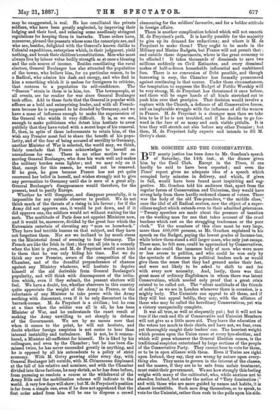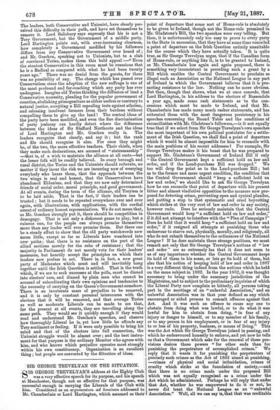MR. GOSCHEN AND THE CONSERVATIVES.
BUT scanty justice has been done to Mr. Goschen's speech of Saturday, the 14th inst., at the dinner given him by the Cecil Club. Except in the Times, it can
hardly be said to have been reported ; and even the
Times' report gives no adequate idea of a speech which occupied forty minutes in delivery, and which, if given in fall, would have been found moat inspiriting and sug- gestive. Mr. Goschen told his audience that, apart from the regular forces of Conservatism and Unionism, they would have strong help from three hardly reckoned classes of voters. There was the body of the old Ten-pounders, " the middle class," once the idol of all Radical orators, now the object of a super- cilious neglect which extends even to their admitted grievances.
" Twenty speeches are made about the pressure of taxation on the working man for one that takes account of the cruel burdens which rest on the struggling tradesman or the poor clerk." Yet the numbers of this class must be very large, more than 400,000 persons, as Mr. Goschen explained in his speech on the Budget, paying the lowest grades of Income-tax, while below them stand a still larger mass, who only just escape. These men, he felt sure, could be approached by Conservatives, and so also could the immense body of men who were more or lees averse to politics, and who could be won only by the spectacle of firmness in political leaders such as would give them the sense that they had ground under their feet, and were not likely to be asked to shift to and fro with every new necessity. And, lastly, there was that great mass of ordinary Englishmen in whom there was latent
Conservatism, which needed only proof that a great crisis existed to be called out. The " silent multitude of the friends of order," as we see in London whenever there is occasion, is a
mighty body. The Unionists can appeal to all these, and if they will but appeal boldly, they may, with the alliance of those who may be called the hereditary Conservatives, yet win a victory unexpectedly complete.
It was all true, as well as eloquently put ; but it will not be true if the rank and file of Conservative and Unionist Members will not give us a little more aid. They leave the education of the voters too much to their chiefs, and have not, we fear, even yet thoroughly caught their leaders' cue. The heaviest weight which presses upon the Union cause at every bye-election, and which will press whenever the General Election comes, is the traditional suspicion entertained by large sections of the people of the Conservative Party. They cannot bear to vote for them, or to be in open alliance with them. Even if Tories are right upon Ireland, they say, they are wrong by nature upon every- thing else. They mean to govern in the interest of the classes, and the masses, if they are to be safe from unfair treatment, must resist their government. We see how strongly this feeling weighs with many of the cultivated, who, while anxious not to abandon Ireland, fret under the notion of "Tory domination ;" and with those who are more guided by names and habits, it is almost irresistible. Such men drag themselves, so to speak, to vote for the Unionist, rather than rash to the pone upon his side.
The leaders, both Conservative and Unionist, have clearly per- ceived this difficulty in their path, and have set themselves to remove it. Lord Salisbury says expressly that his is not a Tory Government, but the Government of a middle party. Lord Harlington points out, with ever-increasing clearness, how completely a Government modified by his followers differs from any Conservative Government ever heard of and Mr. Gosohen, speaking not to Unionists, but to a club of convinced Tories, makes them this bold appeal :—" Even the stoutest Conservative in this room must be conscious that he is a Radical as compared with what he had been twenty years ago." There was no denial from the guests, for there was no possibility of any. The change which has passed over Conservatism since the adoption of the new suffrage is one of the most profound and far-reaching which any party has ever undergone. Imagine old. Tories thinking the diffusion of land a Conservative necessity, pleading for the popular government of counties, abolishing primogeniture as either useless or contrary to natural justice, accepting a Bill repealing tests against atheism, and releasing insolvent farmers from their burdens without compelling them to give up the land The central ideas of the party have been modified, and even the fine discrimination of party jealousy can hardly detect where the difference between the ideas of Sir Stafford Northe.ote and the ideas of Lord Harlington and Mr. Goschen really is. The leaders recognise that clearly, and say it ; but the rank and file should recognise it also. For once they might be, of the two, the more effective teachers. Their chiefs, when they make such declarations, are accused of "statesmanship " —that is, of a wish to maintain the alliance at all costs—but the lesser folk will be readily believed. In every borough and rural diatriot, the Tories and the Unionists should reiterate, no matter if they incur the risk we are incurring now of wearying everybody who hears them, that the approach between the two wings is real and honest, that the Conservatives have abandoned Eldonism, and that they are now only determined friends of social order, moral principle, and. good government. At all events, during the terra of the alliance, old Toryism is to be laid aside. That is the fact, if their leaders can be trusted ; but it needs to be repeated everywhere over and over again, with illustrations, with applications, with the cordial assent of ordinary honest representatives. We do not mean that, as Mr. Goschen strongly put it, there should be competition in demagogy. That is not only a dishonest game to play, but a ruinous one, for the people can always promise themselves more than any leader will ever promise them. But there can be a steady effort to show that the old party watchwords now mean little, except so far as Liberals have wandered into new paths ; that there is no resistance on the part of the allied sections merely for the sake of resistance ; that the majority in Parliament do not merely vote for their leaders' measures, but heartily accept the principles on which their leaders now profess to act. There is, in fact, a new great party of Moderates which must and will inevitably hang together until the Irish Question is settled. That is the truth which, if we are to seek successes at the polls, must be dinned into electors' ears, and dinned by plain men who cannot be accused of subordinating their own opinions and tendencies to the necessity of carrying on the Queen s Government somehow. There is an inveterate mass of prejudice to be removed, and it is only by constant personal intercourse with the electors that it will be removed, and that average Tories as well as moderate Liberals can be made to see that, for the present at all events, they are travelling along the .same path. They would see it quickly enough if they would read and understand Mr. Goschen's speeches, and observe how thoroughly Liberal he is, yet how little he offends any Tory sentiment or feeling. If it were only possible to bring his mind. and that of the electors into full connection, the Unionist struggle would be almost over; and the best instru- ment for that purpose is the ordinary Member who agrees with him, and who knows which prejudice operates most strongly within his own constituency. Organisation is an excellent thing ; but people are converted by the filtration of ideas.



















































 Previous page
Previous page